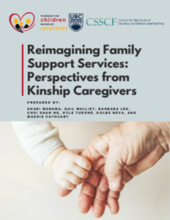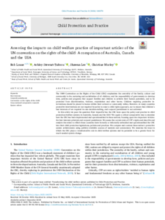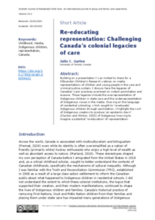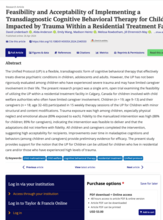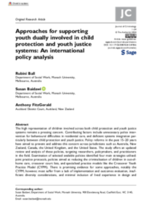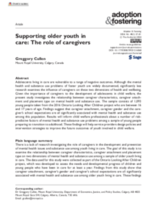Displaying 1 - 10 of 345
This report presents findings from a 2022 consultation with kinship caregivers across British Columbia, highlighting their experiences navigating children and family services. Analysis revealed the need for recognition and respect for kinship families, improved access to consistent and equitable supports, trauma-informed and culturally grounded practices, and stronger collaboration with service providers, with caregivers’ calls for action emphasizing system improvements to sustain caregiving and promote children’s well-being.
The 1989 Convention on the Rights of the Child (CRC) affirms the importance of family, culture, and community in children’s lives and obligates governments to support families and protect children from discrimination, violence, and exploitation, yet many countries still lack policies that require a child-rights approach, prioritize best interests in decision-making, or prohibit corporal punishment. This article critically examines how effectively Australia, Canada, and the United States have implemented key CRC principles—particularly best interests and corporal punishment—by comparing their child protection policies, legislation, and practices to assess the Convention’s influence and its potential to drive broader system reform.
This scoping review examined the scientific literature on youth aging out of substitute care in Canada to address challenges in estimating the country’s contribution to this growing global research field. The review identified key trends, research gaps, and future directions, emphasizing the need to better integrate existing findings to build a more cohesive Canadian evidence base.
Building on a presentation invited for a Kilbrandon Children’s Research webinar on media representations of children and young people in the care and criminal justice system, this article discusses the legacies of Canadian ‘care’ practices premised on violent assimilation and erasure.
In this chapter, the authors explore the intricate relationships between young disabled children, their families, institutional settings, and disability services in Canada, with an emphasis on the challenges stemming from unstable custodial dynamics and governmental interference.
This research project was an open trial examining the feasibility of utilizing the Unified Protocol (UP) -- a form of cognitive behavioral therapy -- within a residential treatment facility in Calgary, Canada for children involved with child welfare authorities who often have limited caregiver involvement.
This study offers an updated review and analysis of policy reforms across both the child protection and youth justice systems in jurisdictions such as Australia, New Zealand, Canada, the United Kingdom, and the United States, targeting researchers, policymakers, and practitioners in the field.
This study examines the health of Canadian youth in care and their engagement with the Canadian health care system on a population level.
In this article, the authors present considerations related to the global mandate for child protection and the challenges that persist amongst marginalized communities. Subsequently, they focus on Canada and, in particular, the Ontario example: the trends from the Ontario Incidence Study of Reported Child Abuse and Neglect (OIS). This child welfare epidemiological project has highlighted the need for greater intersectional adjustments to best protect children, where the iterative research-policy cycle has most effectively been seen with a formal system for the inclusion of lived experience, as in the case of Indigenous peoples.
The goal of this study is to examine the relationship between caregiver characteristics, caregiver attachment and placement type on two dimensions of mental health and substance use among a sample of older youth living in care in Ontario, Canada.

